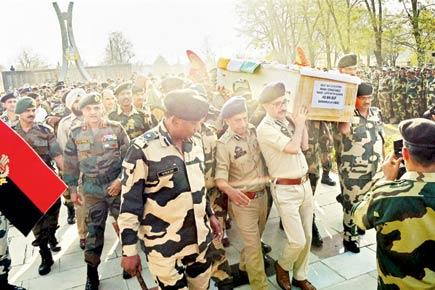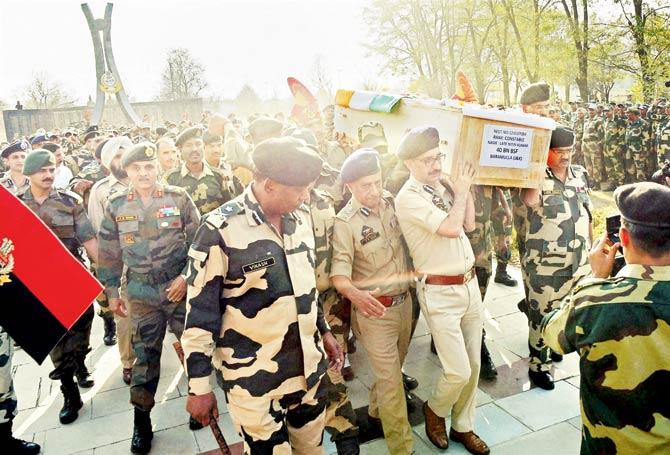This nation belongs to us all, and if India were to go to war, there must be space in this democracy for being a conscientious objector


BSF and police personnel carry the coffin of Constable Nitin Kumar, who was martyred in the Baramulla attack. Pic/PTI
ADVERTISEMENT
 Well-known Bengali writer Mahasweta Devi died in July this year. Her death received many condolences and her writings, admiration from Union ministers to the general public.
Well-known Bengali writer Mahasweta Devi died in July this year. Her death received many condolences and her writings, admiration from Union ministers to the general public.
Mahasweta Devi was a writer and a social activist. Her words and work are about the oppressed, the hidden and the forgotten. Her protagonists grapple with the cruel state powers. Her writing does not leave you with a comfortable feeling; it forces you to question your assumptions.
Students and teachers of Haryana’s Central University’s English and foreign languages department decided to commemorate Mahasweta Devi’s life and works by putting up a play, Draupadi, and showing the film Hazaar Chaurasi ki Maa — after securing relevant permissions. The play was based on Mahasweta Devi’s short story Draupadi which deals with Adivasi struggles against exploitation by zamindars, set in 1971. The protagonist, Dopdi, is a survivor of custodial gang-rape. The story is painful, harsh and raw, and fills the reader with shame at the horrors that humankind is capable of.
Since so much in India makes no sense any more, the student wing of the BJP, the ABVP, has staged virulent protests and filed police cases against teachers and students because, since the rapists in the play are soldiers, the production apparently shows the Indian Army in bad light. Therefore, they say, it is “anti-national” and the very act of performing it is also “anti-national”.
We are caught right now in a public frenzy, with loud voices — largely in the television media and some from former military personnel — calling for war with Pakistan. Anyone who disagrees is accused of being “anti-national”, a phrase used so often now that it is becoming meaningless. If you dislike the prime minister, you are anti-national. If you read Mahasweta Devi, you are anti-national. If you watch some TV serial made in India with Pakistani actors, you are anti-national. And if you do not want war, you are definitely anti-national.
How far can this kind of accusatory discourse take us? If it was all TV fuss and bluster, it would not matter. But as we have seen since the attack on the Indian Army camp at Uri on September 18, the drums of war have only got louder. They lost a touch of momentum when the prime minister said on September 24 that we should fight poverty better than Pakistan, but became loud again when the Indian Army announced on September 29 that it had conducted “surgical strikes” against terror “launch pads” within Pakistan-occupied Kashmir.
The cost of war, not in financial terms, but in terms of life and misery, is not up for discussion. Diplomacy is now a dirty word used by cowards. Seeing no contradiction in their patriotic tears over the martydom of our soldiers at Uri, the war drummers call for the deaths of more soldiers — more pain to more families. The ‘N’ word is also attributed to an anti-national — to someone who is against India showing its might, so what if India and Pakistan are both ‘nuclear’ states. Another ‘N’ word comes to mind — naivete.
This particular form of patriotism thrives only at the most basic level. The target is not Pakistan so much as Pakistani actors and singers who work in India. And more than them, it is railed against Indians who feel every Pakistani is not a terrorist. This very statement is, apparently, an extreme act of anti-nationalism.
For some Indians though, custodial violence, oppressing the already oppressed and state subjugation is anti-national. To be ‘nationalistic’ does not mean supporting this government or that. Trying to push a country to war is in itself anti-national. And the nation belongs to all of us. Mahasweta Devi, Draupadi, the jawans martyred at Uri — not just to screaming TV anchors and retired military generals. And if we were to go to war, there must be space in a democracy for being a ‘conscientious objector’. Legendary American boxer Muhammad Ali refused to fight in the Vietnam War.
This is the incomparable Bertrand Russell about WW1: “Those who saw the London crowds, during the nights leading up to the Declaration of War, saw a whole population, hitherto peaceable and humane, letting loose, in a moment, instincts of hatred and blood lust.”
It is a point of view where humanity means more than this. You can consider it anti-national if you will.
Ranjona Banerji is a senior journalist. You can follow her on Twitter @ranjona. Send your feedback to mailbag@mid-day.com
 Subscribe today by clicking the link and stay updated with the latest news!" Click here!
Subscribe today by clicking the link and stay updated with the latest news!" Click here!






